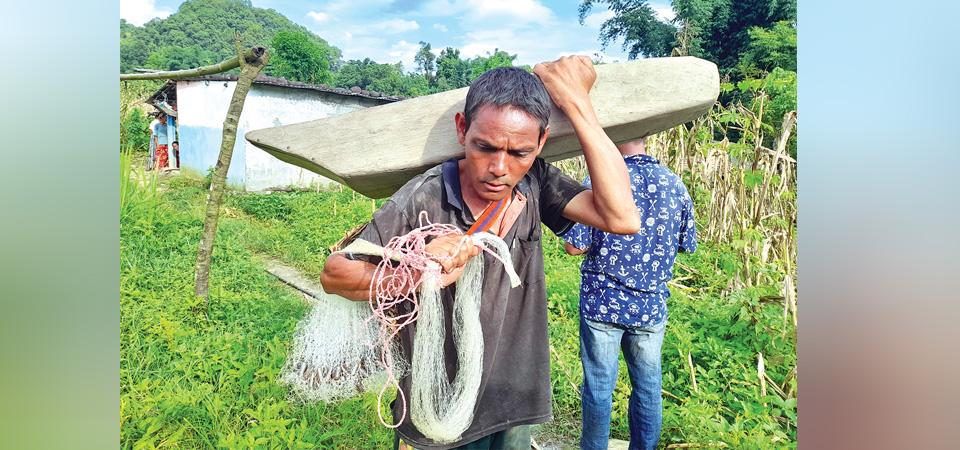Bote language on verge of extinction

By Amar Raj Naharki
Tanahun, July 30: The language of the marginalised Bote community is dying.
While the elders still speak the language, the youngsters don’t and many parents have stopped teaching the language to their children. This is causing some in the Pani Bote (those who collect gold nuggets from river sand) and Pakhe Bote (fishermen and farmers) communities of Vyas Municipality–10, Tanahun to worry that their language might go extinct in the near future. Min Bahadur Bote, 68, has seen the language decline significantly in his lifetime. “Up until a few decades ago, everyone used to speak the Bote language. Now, hardly anyone does,” he lamented.
Niraj Majhi, president of the Bote Society, feels that the lack of use of the language in the family is the reason behind its decline. “Parents feel that teaching their children Nepali or English will open doors for them that the Bote language cannot. That is why they do not use the language with their wards,” he said.
Similarly, Jit Bahadur Bote believes that the loss of traditional professions is contributing to the death of the indigenous language. “Back in the old days, Botes fished or farmed and only interacted with members of their community. Now, Bote youths need to go abroad for work and have to interact with people from other ethnic groups which can only be done in Nepali. So, the younger generation of Botes prefer Nepali over their mother tongue,” he explained.
Likewise, Ward No. 10 Chairman Tulsiram Sapkota shared that an inferiority complex had developed among Bote youths. “They feel ashamed of speaking their language in front of others.”
He also noted that increasing inter-ethnic marriages had caused a decline in the usage of Bote language at home. “Members of the Pakhe Bote community are increasingly marrying outside their clan.
So, to accommodate the non-Bote members who cannot speak or understand the language, families choose to use Nepali,” he observed.
There are 60 households of Pakhe Bote and 40 of Pani Bote in Ward No. 10. Some Bote families also live in a few other wards of Vyas Municipality. They have a rich oral language but do not have an accompanying script which is preventing the transfer of linguistic culture from the older generation to the newer one, said Shree Krishna Acharya, a teacher at the local Chandidevi Rastriya Secondary School. He also stated that the need to mandatorily know Nepali and English for education had pushed many Bote parents to favour these languages for their children at the cost of their own tongue.
Whatever the reason, the present decline threatens to wipe out the identity of the Bote community, worried Majhi.
“How can we preserve the Bote identity if the language it relies on goes extinct?” he questioned.
According to Acharya, the death of the Bote language would not just mean the death of words but also the death of centuries of traditional knowledge, experience and lifestyle. “Languages carry ideas, information, history and emotions of a particular community. Thus, when they die, they cause an irreparable loss to a group’s heritage,” he stated.
Acharya clarified that the languages of the Pani Bote and Pakhe Bote were not the same and thus, both languages needed to be preserved with equal importance. He also urged all three levels of government to view the loss of Bote language as a matter of concern.
Recent News

Do not make expressions casting dout on election: EC
14 Apr, 2022
CM Bhatta says may New Year 2079 BS inspire positive thinking
14 Apr, 2022
Three new cases, 44 recoveries in 24 hours
14 Apr, 2022
689 climbers of 84 teams so far acquire permits for climbing various peaks this spring season
14 Apr, 2022
How the rising cost of living crisis is impacting Nepal
14 Apr, 2022
US military confirms an interstellar meteor collided with Earth
14 Apr, 2022
Valneva Covid vaccine approved for use in UK
14 Apr, 2022
Chair Prachanda highlights need of unity among Maoist, Communist forces
14 Apr, 2022
Ranbir Kapoor and Alia Bhatt: Bollywood toasts star couple on wedding
14 Apr, 2022
President Bhandari confers decorations (Photo Feature)
14 Apr, 2022










